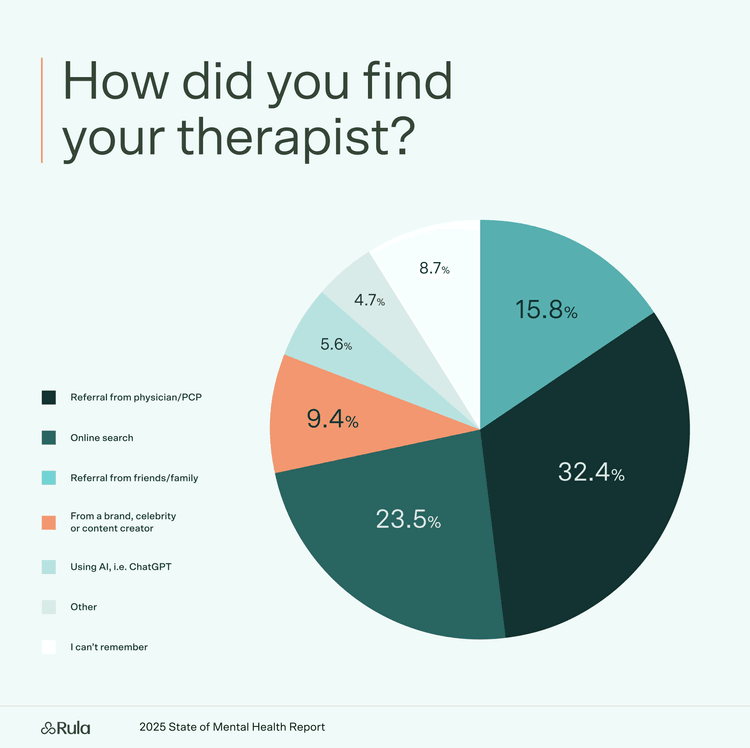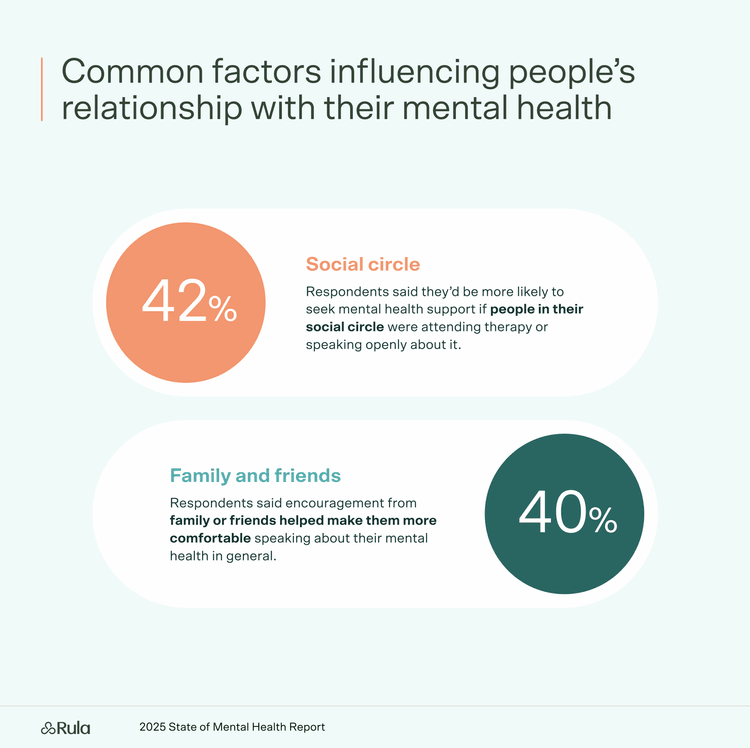Survey data collected by Rula from +2,000 Americans uncovers how people feel about therapy and their mental health in 2025
Key Takeaways
There are more ways than ever before to access mental healthcare. This means that therapy experiences can look a little bit different for everyone.
The current economic climate and misinformation on social media are creating new barriers to mental healthcare access.
Family, friends, and peers can have a significant impact on attitudes toward mental health — including decisions about whether or not to seek care.
Understanding how people perceive their mental wellbeing — especially in such a rapidly changing world — is vital to Rula’s mission to connect people with the mental healthcare they need.
In honor of National Mental Health Awareness Month, we’ve released the 2025 State of Mental Health Report: Mental Well-being in a Changing World.
Surveying over 2,000 U.S. consumers, the report was designed to illuminate:
People’s relationship with their mental health
How people feel about mental health services, such as therapy
Which factors have the biggest impact on people’s decisions about mental healthcare
Below, we break down some of the major findings from this report and what they mean for the future of mental wellness.
Five major trends uncovered in Rula’s 2025 State of Mental Health Report:
1. People are embracing mental health support — and there are many pathways to finding care.
Taking the first step towards better mental health can be challenging, even with all the right resources at your fingertips. It’s encouraging, then, that over 50% of the respondents Rula surveyed have been able to access mental healthcare at some point in their lives.
Among those who have received mental health support:
28.3% are currently in therapy
25% have sought therapy within the last year
24.8% have been to therapy in the last 1-3 years
Everyone’s therapy journey is different. Fortunately, people have plenty of different ways to get connected to the care they need.

How did you find your therapist?
23.5% – Online search
32.5% – Referral from physician/PCP
15.8% – Referral from friends/family
9.4% – I looked into a therapy resource I learned about from a brand, celebrity or content creator
5.6% – Using AI, i.e. ChatGPT
4.7% – Other
2. An uncertain world is driving people to seek help, but many are struggling to access it.
These are challenging times, and external pressures can directly impact mental health. Therapy can help people cope with these challenges and regain a sense of autonomy in a world where everything feels out of control. It’s no surprise, then, that 28.5% of respondents say economic uncertainty would influence their decision to seek care.
However, not everyone who needs care can afford it. Cost remains the biggest barrier to access, and a potential recession and rising costs of living could put care even further out of reach.
25% of respondents stated that the cost of care would discourage them from seeking mental health support.
42.9% of respondents said that increased costs due to economic factors – such as tariffs, inflation and a rising cost of living – have impacted their ability to access mental healthcare.
Cost-related concerns mean that people who may be seeing progress in therapy are quitting. 19.2% of respondents stopped going to therapy because they felt it became too expensive, and 15.9% did so because their insurance coverage changed or ended, making care unaffordable.
3. Online platforms mean there are more ways than ever before to “go to therapy.”
It may feel like therapy is everywhere in popular culture: from the widespread adoption of “therapy-speak” on platforms like TikTok, to celebrity testimonies about their experiences with their mental health, and TV shows tackling mental health-related plotlines. But what does it actually look like to go to therapy today?
The answer is that there is no one-size-fits-all approach to therapy anymore — and that’s a good thing.
Today, people have a wide range of options for how they can access therapy and get the support they need to reach their goals. For example, the survey found that nearly a quarter of respondents would prefer an online option over traditional in-person appointments.
The growth of online therapy means that people have access to a wider set of therapists, beyond those that they’d be able to commute to. This means that it’s easier than ever before to find a therapist with expertise in a specific treatment type. When people have access to diverse mental healthcare options, they can try multiple approaches, providers, and formats to find a good fit.
4. Even in a world of endless perspectives online, our beliefs toward mental health are shaped by those closest to us.
Seeking mental healthcare is a personal choice, but we’re all influenced by the culture and people around us. Like with other major life decisions, people’s approaches to mental healthcare are influenced by their friends, family, and others within their immediate social circle. Rula found that these close relationships and social influences have the greatest impact on inspiring people to take the next step on their mental health journey — more so than public figures and brands.

41.7% of respondents said they’d be more likely to seek mental health support if people in their social circle were attending therapy or speaking openly about it.
39.9% of respondents said encouragement from family or friends helped make them more comfortable speaking about their mental health in general.
Our stories and actions often have more impact than we realize — especially within our closest circles. Simply sharing your experience might offer someone you care about the encouragement they need to begin their own mental health journey.
5. When it comes to the conversation around mental health, social media is a mixed bag.
The digital landscape means that we have greater access to health-related information than ever before. At the same time, viral social media trends and misinformation may deter people from seeking mental health support.
A shift in wellness culture, especially on social media, may be sowing distrust in clinical mental healthcare. The 2025 State of Mental Health Report found that Gen Z — the most active generation on social media — was the group most likely to express distrust in the medical system as a reason for not seeking mental health support.
Men were also more likely than women to report distrust in the medical system as a reason they didn’t seek care, which aligns with research showing that men are historically more susceptible to medical misinformation. When combined with enduring stigma around men’s mental health, misinformation could potentially heighten feelings of distrust and make men less likely to seek the care they need.
That said, social media can also be a force for good in changing the culture around mental health. By speaking up about their mental health, people can help others understand their symptoms, feel less alone, and get inspired to find care.
Imagining the next frontier of mental wellness with Rula
Accessing quality mental healthcare should feel empowering, not overwhelming. The trends uncovered in our 2025 State of Mental Health Report highlight what holds people back when seeking support — from stigma to uncertainty about where to start. By bringing these challenges into the open, we can all help create a future where mental health conversations are more inclusive, compassionate, and action-driven.
Rula makes it easier to find a licensed therapist or psychiatric provider who accepts your insurance, so you don’t have to choose between affordable care and excellent care. With a diverse network of more than 15,000 providers, 24/7 crisis support, and appointments available as soon as tomorrow, we’re here to help you make progress — wherever you are on your mental health journey.